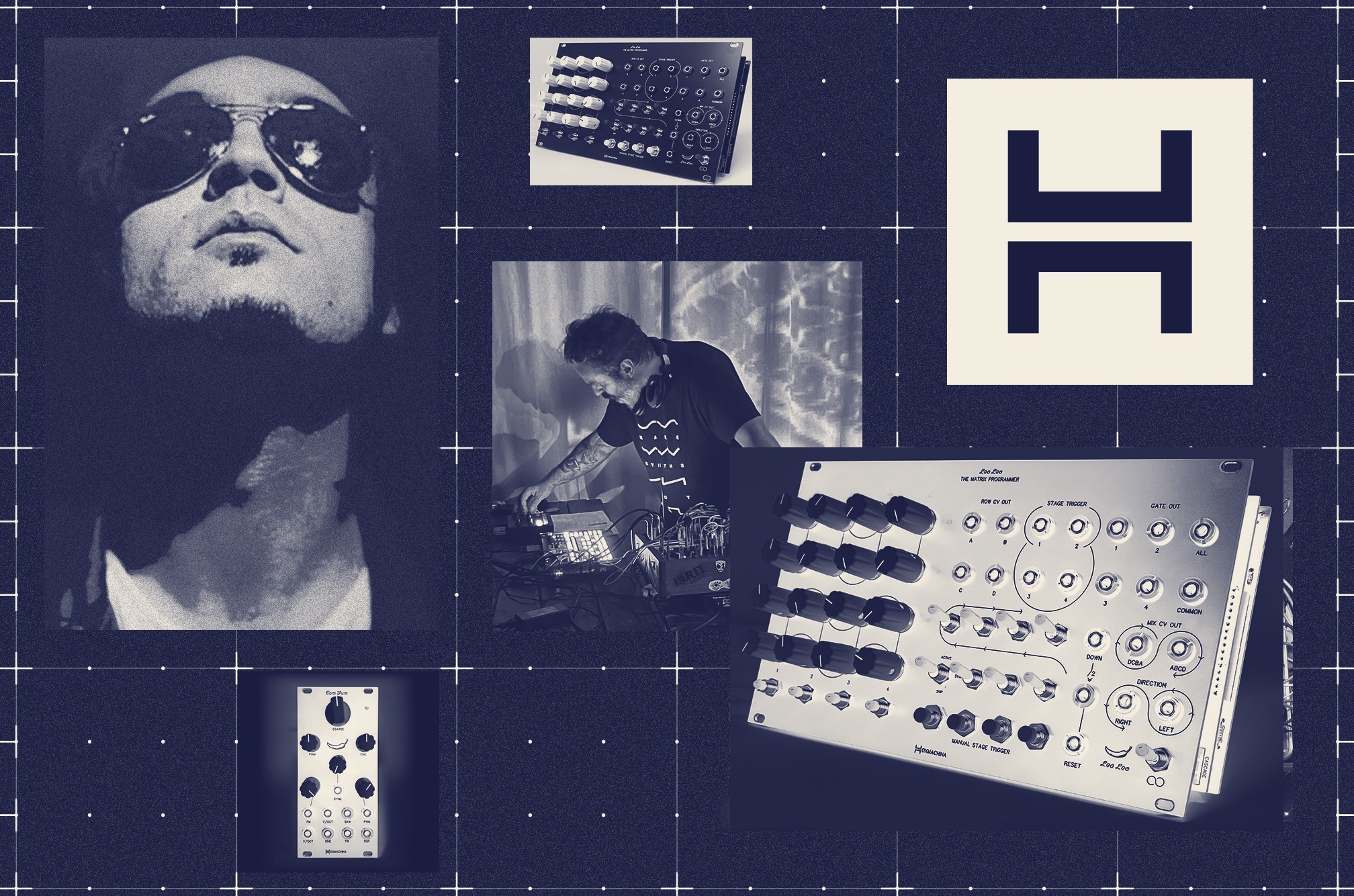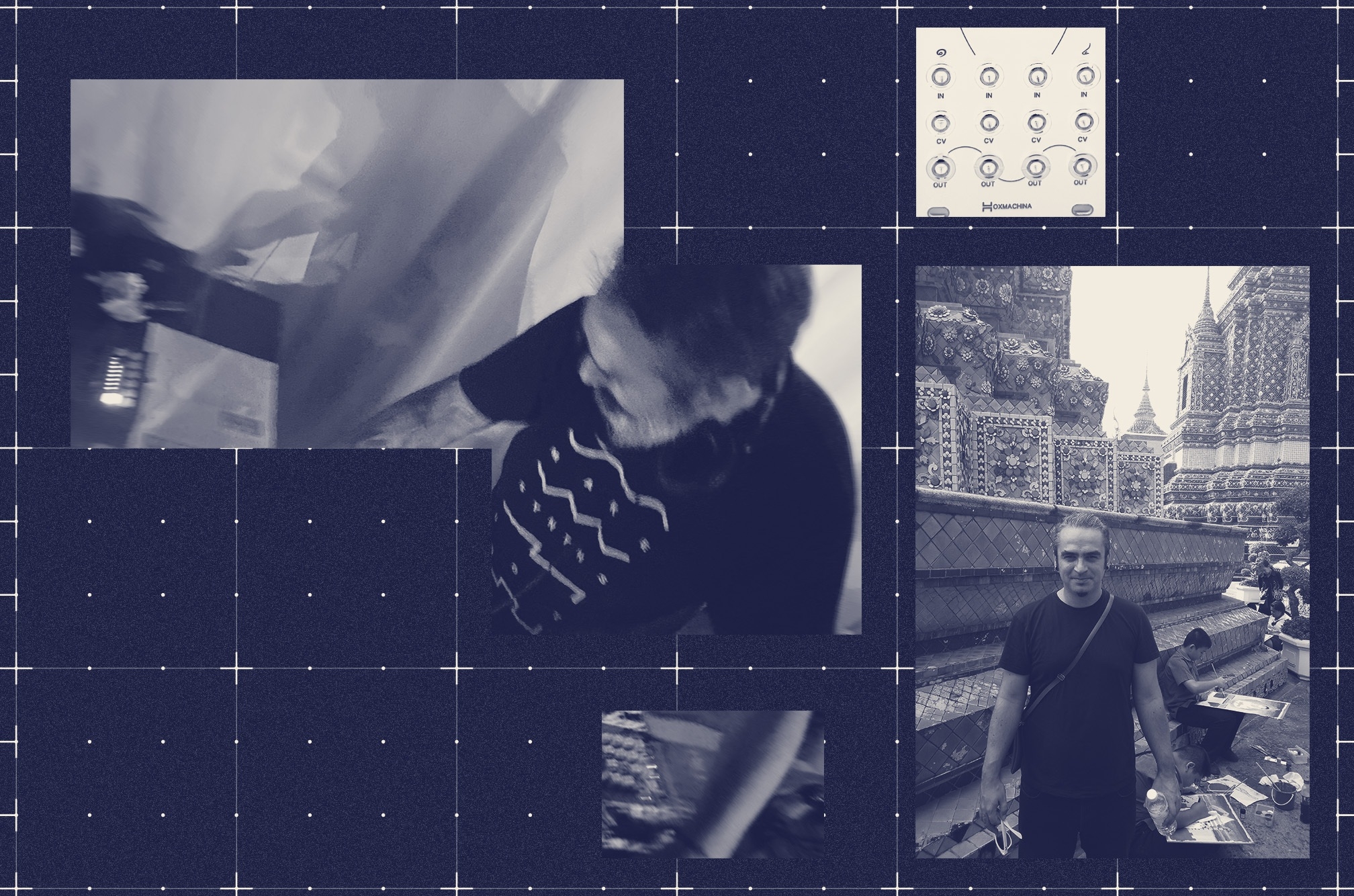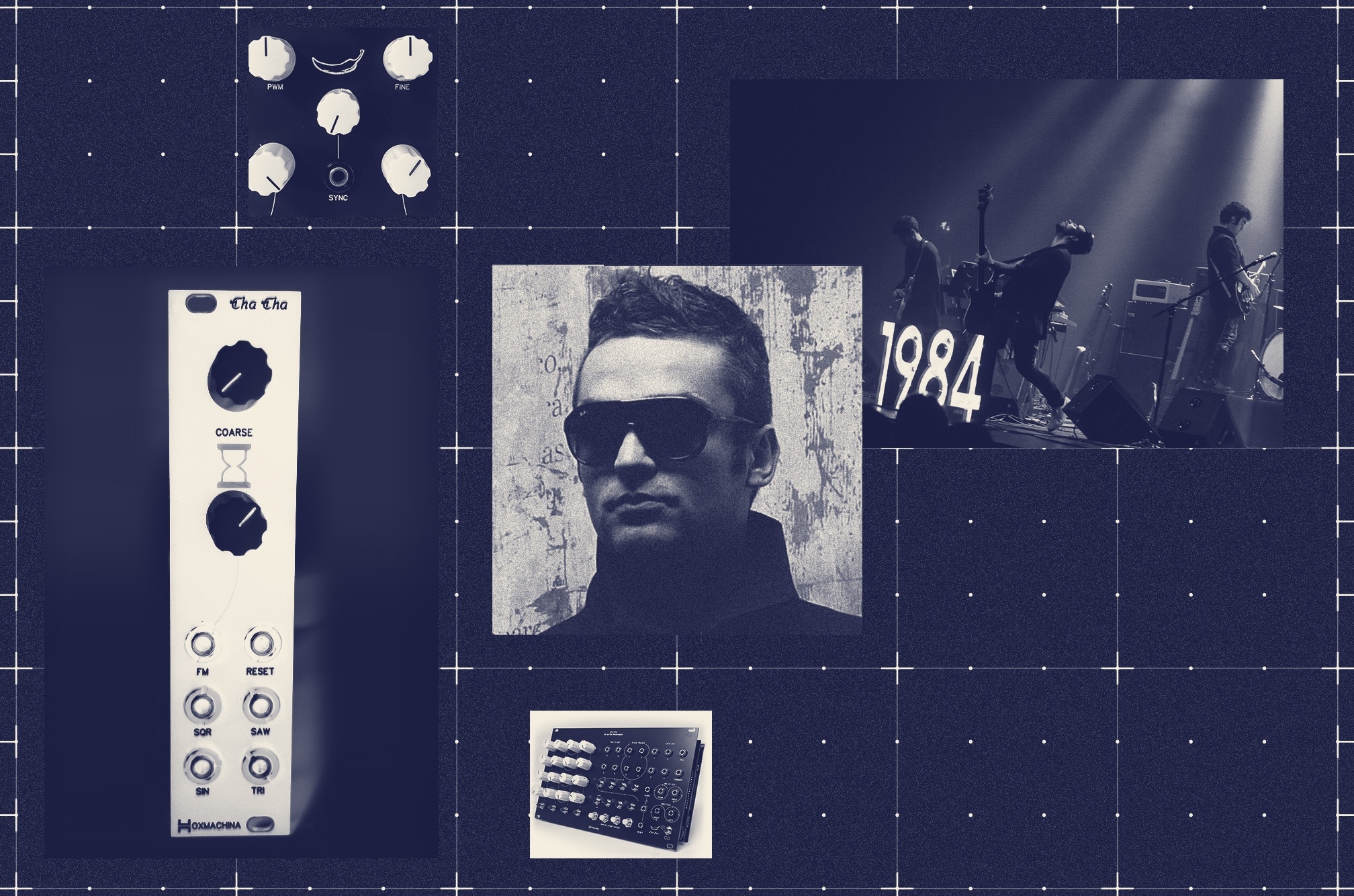 Features
Features
Voxmachina's post-punk roots fuel his modular methods
SynthAsia Episode 2: Arne Venema heads Bangkok to speak with the city's first modular synthesizer artist & company
SynthAsia is a collaborative video series between CFK Productions and Mixmag Asia which focuses on synthesizer culture, from modular to traditional, across Southeast Asia.
From meeting modular builders, and exploring their environments to diving into their creative and music productions, SynthAsia aims to spotlight both established and lesser-known protagonists who dedicate their lives to the modern craft.
For the first episode of SynthAsia, Arne Venema from CFK Productions visited the northern Thai region of Chiang Mai where he speak with Pete Wallis of Siam Modular — the country's first modular synthesizer company. For our second episode, Arne headed south to Thailand's bustling capital city, Bangkok to meet Pedro Euginio aka Voxmachina.
Voxmachina is the name of the modular synth company run by Portuguese-born Pedro Eugenio, as well as his own artist persona. Originally finding success in Portugal’s post-punk scene, he later moved across Europe and eventually ended up in Bangkok where he delved into the country's modular scene and started the city's first modular synthesizer company.
Dive into the video below and read on to learn more about Voxmachina's modular musings in Bangkok.
How did the name Voxmachina come about?
I’ve been using the name for about twenty years now, it was in fact my very first musical solo project, even before the bands. I was looking for a simple name to define myself in my relationship with music and always being fascinated with music machines, I thought that then I would have my voice through the machine and thus I’ve become the voice machine aka ‘Voxmachina’.
Is there a punk rock attitude when it comes to modular music?
When it comes to modular music, I feel part of playing with modular instruments is to break out of the norm, break out of what is expected, experiment, and see how far it can go in creative terms and experience, so that’s the punk spirit in action for sure! Because modular instruments are themselves abstractions of instruments in a way that makes everything possible to happen within a modular system then that becomes the canvas for one to create their own instrument, their own unique voice and creative expression, breaking out with all norms and rules, and because there are no given rules for such a unique system and instrument, then everything becomes possible and as with punk, post-punk, punk-rock music, ingenuity takes over the established creational rules of music and a desire to break out of the norm, out of the template, arises.
To what extent did your post-punk roots help your musical sensibilities when it came to modular?
Funny fact, post-punk was once named “new musick” back in the day, so there was always this factor of discovery running side by side with it which quickly translates to the discovery of all kinds of musical instruments and experimentation as you can also discover on early bands/projects like one of my favourites “Suicide” from Alan Vega, they were playing with weird machines and modular synths from the beginning as well so it was a natural transition for me to start experimenting with modular synths.
What artistic mediums outside of music inspire you be it art, movies etc?
Literature is a big one, just to think that most of our human history's higher intellect and knowledge is saved and preserved in written form is quite amazing, also I love reading because it allows my imagination to build the world in which the characters play the story, it’s such a magical experience, very similar to music I would say where the listener has the space to fill in with their own experiences and imagination, painting as well very similar, movies for me are in a different spectrum I would say, more on the entertainment side even though there are a couple of amazing movies that can have that similar effect to me in terms of creative experience Terrence Malick movies are a good example of that experience to me.
In the documentary you mentioned getting into electronic music when you were still in Portugal, what were the gateway tracks for you?
Somehow at a young age, mostly due to an older great friend at the time, I got into some really obscure music at that time in Portugal that absolutely no one else even knew about it, like Stockhausen for example, that triggered a whole different level and experience for me at that time when it comes to electronic music or Suicide that I really felt in love with as it connected so well to the punk, post-punk movements, and Throbbing Gristle with their industrial wall of sound and vocal creativity, that was amazing being so young and lucky enough to discover them at that moment in time, a more well-known name would be Prodigy of course, I would bang my head listening to Prodigy almost on a daily basis, it was such a storm of fresh air when they came out with their music 'Voodoo People', 'Firestarter' these songs really take me back!
You mention that you started to look towards Moog, Buchla and Serge as inspiration. How important do you think it is for musicians and synth builders to know their musical history?
It’s, for me, massively important to know the history of the tools and knowledge one uses for their own personal expression, it creates a deep connection with the instruments and with the music creations as well, only with the understanding of the past we can really change the future, I think this applies to all fields, I don’t see how we can create and really innovate, without looking into what was done before, we all build from history and when one goes deeper into that knowledge then it also spurs creativity, like reading a good book, suddenly you can fill out the empty spaces with your own imagination.
How long did it take to build your sequencer?
So I think I was on and off for about two years on it, part or most of it was actually learning and reading old electronic magazines and excerpts from Moog, Buchla, and Serge, just to understand how they had built their own sequencers and other modules, this one particularly takes most from Serge, from its Serge Programmer from the 70s era, and has it was all discrete components it took me quite a while just to understand the moving concepts of its inner workings and only then I could start to build my own interpretation of it, so overall I would say around two years and the last part of it was adding my own design on top of the inspiration which resulted in my matrix version of a programmer.

What are the most difficult and the most joyful parts of building the Voxmachina prototypes? How do you choose what products to develop next?
Most people believe making your own instruments is cheaper, but it's not! Mostly due to the whole prototyping process which takes several iterations until you have a working product, apart from that I honestly love every aspect of it, of course, the most amazing moment is when you finally see your creation coming to life and making noise! The products that I want to build next are basically things that I envision that I would want to use to make my music and then the creative process kicks in in a way that I also don’t want to make something that already exists, so it’s a great balance between functionality and exploration of what could be, and most of all I’m looking to create instruments that facilitate a connection between the musician and the machine, I come from playing the guitar, bass and keys for many years, one of the challenges when playing with these type of instruments is finding that connection, so I look to create instruments that allow for that connection to happen naturally.
How did you first meet Pete Wallis from Siam Modular?
Well, Pete is the inspiration behind my maker adventure, I got in touch with him as soon as I started to plan to make my own modular instruments, and very soon after he invited me to play at one of his events in Chiang Mai. Pete is the original, first maker in Thailand to build and sell modular instruments for Eurorack systems, so naturally, I had to get in touch, and from the moment we got in touch it was an immediate connection bounded by the love of music and modular synths, who would have told that I would find that connection in Thailand, but I’m glad that I did and super thankful to Pete for all the support, friendship and guidance that he has been providing for my maker journey, also we’ve been having too much fun playing together all across Thailand, thanks Pete!
How can someone see a live modular show if they come to Bangkok? Do you also organize gigs people can attend?
Since I started on this journey I’ve also been lucky to connect to the community of musicians around Thailand, and more specifically Bangkok and venue owners who are more than happy to host events for the modular synth musicians and community, I regularly host a “Modular Night” in a well known and mystical place in Bangkok “JAM”, it has been such a blast, the last one was so full we had people hanging outside the venue just enjoying a full house, and the result of this increasing interest has resulted in sponsorship from Arturia for these events, amazing! I still find it amazing that these things happen in this massive city.
Do you think AI will ever be implemented in the development of hardware modules?
Interesting topic, I most definitely believe so, I have already started to see some use cases, for example, some sequencers already implement a sort of an A.I. model to sequence musical events in a more generative way. So for sure, A.I. will come to all things really, as a Software Engineer by trade I know that A.I. will become a very common thing in all components very soon I think, it will become the next common development ground for music, software, apps and everything in between. I am of course also experimenting at the moment, it’s so crazy to me that I have an A.I. Master Degree years ago, a long long time ago, and now finally I start to see real-world applications of it, so now I’m thinking “ok, it’s time to go back to A.I. developments”! A.I. has been present for a very long time, all the ideas and concepts we’re seeing now coming to live have been imagined since the 80s already, like true sci-fi now we’re seeing finally machine power that is able to materialize those ideas, exciting times, a big social change is coming again, much like the event of internet, or social networks I would say that will for sure change the way we interact with each other and with everything around us.

What’s the most significant evolution you’ve personally experienced/witnessed in Asia’s music scene since you first started in it?
The world runs very fast these days, to think that when I started exploring the world of modular synthesis there were literally three or four people in that “scene” and now it feels like a small crowd already, it has been amazing to observe this journey and this continuous growth of interest for more alternative music, more experimentation. I think it’s very well connected to the surroundings as well, if you look into context you’ll notice that Thailand itself has been through amazing cultural growth bursts these past few years.
What's the best thing about Bangkok's electronic music scene for you?
What I love about the music scene in Bangkok is that there is space and time for everyone, you can have your house parties, your EDM nights in big warehouses full of people and you can have your own alternative bubble world as well at the same time, I suppose it’s an advantage of living in a city that has the same population density as my home country Portugal, 1% in Portugal is almost an empty room, 1% here is a full house, great opportunities to explore within such a massive dense place.
How do you feel local Thais have embraced modular sound culture?
I feel that since it has become more accessible local musicians are super curious and super excited to try, play, and experiment with it as well. Young Thai people are thirsty for change, exploration, and experimentation. I’ve noticed that even when playing in more commercial venues, locals who drop by without really knowing what’s happening get instantly hooked by this vision of a weird massive machine making music, it’s quite warming actually, I’ve never experienced such openness in Europe for example.
Are there any modular artists in Thailand our readers should know more about?
More and more these days, dear reader, do yourself a favour and look into these artists from this side of the world: Electro Mass, Mahakit Mahaniranon, Red Drum, Pradit Saengkrai, Tommy Hanson, Michael Honeycomb and Sugar Miko.
What is your favoured Thai dish?
“Kra Pao”, which is also the name for one of my favourite modules that I’ve built, a resonant low-pass gate inspired by the great late Don Buchla, what I love in Thai food is the balance between sour, sweet, and spicy, I just can’t get enough of it, particularly this dish with Thai basil on the mix, I need to have it at least twice a week!
Sawadee Krub!


